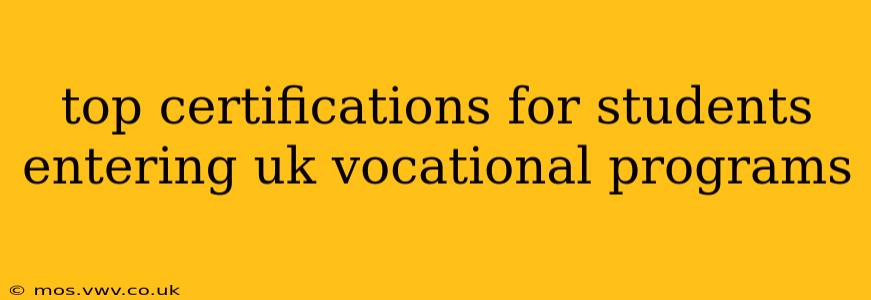Choosing the right vocational program in the UK can be a game-changer for your career. But before you dive in, securing relevant certifications can significantly boost your application and future prospects. This guide explores top certifications that will make you a highly competitive candidate for UK vocational programs across various sectors. We'll cover several key areas and address some common questions prospective students have.
What are the most sought-after certifications for UK vocational programs?
The "best" certification depends heavily on your chosen vocational area. However, some certifications hold significant weight across various sectors. These include:
-
GCSEs (General Certificates of Secondary Education): While not strictly "certifications" in the same vein as others, strong GCSE results, particularly in maths, English, and science, are fundamental for many vocational programs. They demonstrate a solid foundation of knowledge and skills.
-
BTECs (BTEC Nationals): These qualifications, offered at various levels, are highly regarded by employers and educational institutions within the UK. BTECs offer practical, industry-relevant skills and knowledge, making them a strong asset for vocational applications.
-
A Levels (Advanced Level): While often associated with university pathways, certain A Levels can complement vocational applications, particularly those requiring a more academic foundation. This is especially true for fields like engineering or healthcare.
-
Industry-Specific Certifications: Depending on your chosen vocation (e.g., IT, construction, healthcare), specific industry certifications can significantly enhance your application. These certifications prove practical skills and commitment to your chosen field. Look for certifications recognized by professional bodies in your chosen area.
Which certifications are best for specific vocational areas?
The ideal certification varies greatly depending on the specific vocational program you're targeting. Let's explore a few examples:
IT Vocational Programs
For IT programs, certifications like CompTIA A+, Network+, Security+, or Cisco CCNA can significantly improve your chances. These demonstrate foundational IT knowledge and skills sought after by employers.
Construction Vocational Programs
In the construction sector, certifications from the Construction Industry Training Board (CITB) are highly valued. These range from basic health and safety certifications to more specialized qualifications in specific construction trades.
Healthcare Vocational Programs
Healthcare programs often require specific certifications depending on the chosen specialty. First Aid and CPR certifications are almost universally expected, while other certifications (e.g., in phlebotomy or medical assisting) might be beneficial depending on the program.
What are the benefits of having certifications before starting a vocational program?
Holding relevant certifications prior to enrolling in a UK vocational program provides several key advantages:
- Stronger Application: Certifications demonstrate a commitment to your chosen field and showcase existing skills and knowledge.
- Advanced Placement: Some programs may allow for advanced placement or exemptions based on prior certifications, potentially shortening your overall training time.
- Improved Employability: Certifications can make you a more competitive candidate in the job market after you complete your vocational program.
- Higher Earning Potential: Individuals with relevant certifications often command higher salaries.
How can I find out which certifications are required for a specific vocational program?
The best way to determine the necessary or recommended certifications is to directly contact the UK vocational program you are interested in. Check their website for entry requirements or contact their admissions department. They can provide specific information relevant to their program.
Are there any government-funded schemes to help with certification costs?
The UK government offers several funding schemes and apprenticeships that may cover or subsidize the cost of vocational training and related certifications. Research government websites and local council resources to explore available funding opportunities.
By strategically pursuing relevant certifications, you can significantly improve your chances of securing a place in your desired UK vocational program and significantly boost your future career prospects. Remember to always check the specific requirements of the program you're applying for.
